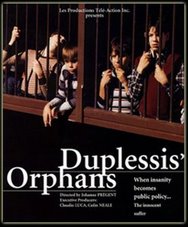
In the 1930s and 1940s, a conservative revolution ushered in an era in Quebec now known as “The Great Darkness.” Led by Premier Maurice Duplessis, the period was characterized by unprecedented corruption and repression, much of which involved the Catholic Church. After Duplessis received the provincial Church’s support during his rise to power, he sought to repay the favor with a bizarre moneymaking scheme revolving around institutionalizing children.
At the time, federal subsidies for mental hospitals were much larger than those given to orphanages, which were largely the responsibility of the provincial government. Beginning in the 1940s, the Duplessis government, in collaboration with the Catholic Church (which ran the majority of the province’s orphanages and mental hospitals) began to systematically diagnose orphaned children with mental diagnoses they did not have. As a result of these false diagnoses, the orphans were sent to psychiatric institutions, where they qualified for the higher federal subsidy. In some cases, orphanages were emptied after their children were declared mentally incompetent, then the orphanage was converted into an insane asylum so the Catholic Church could make more money from the subsidies. Around 20,000 children were wrongly diagnosed and imprisoned in this way.
To make matters worse, many of the orphans weren’t exactly orphaned. Instead, some of them were simply the children of unwed mothers forcibly taken into the custody of the Church, who frowned upon the very existence of childbirth out of wedlock. After being institutionalized, the children were subject to a nightmarish life that included sexual abuse, electroshock therapy, and even forced lobotomies. Some children were used in drug testing and other medical experiments. Many died as a result of their treatment.
By the 1990s, about 3,000 surviving Duplessis Orphans organized to bring their stories to light and pressure the Canadian government for justice. Though they were eventually granted a momentary settlement from the Quebec government, the Catholic Church has yet to apologize for its role in the scandal.
No comments:
Post a Comment